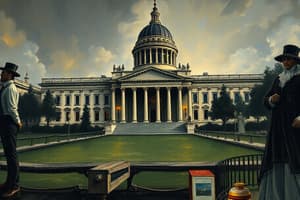Podcast
Questions and Answers
What distinguishes charismatic authority from traditional authority?
What distinguishes charismatic authority from traditional authority?
- Traditional authority is derived from written laws.
- Charismatic authority is never subject to change.
- Charismatic authority is based on personal appeal and inspiration. (correct)
- Charismatic authority relies on established customs.
Which of the following characteristics best describes a totalitarian government?
Which of the following characteristics best describes a totalitarian government?
- Public participation in decision-making.
- Increased social freedoms.
- Limited political pluralism. (correct)
- Multi-party electoral processes.
How do democratic and authoritarian systems primarily differ in terms of citizen engagement?
How do democratic and authoritarian systems primarily differ in terms of citizen engagement?
- Democratic systems allow open political competition. (correct)
- Authoritarian systems feature regular elections.
- Authoritarian systems encourage public protests.
- Democratic systems restrict citizen involvement.
In the context of government, what best describes a theocracy?
In the context of government, what best describes a theocracy?
What is a key difference between power elite and pluralist models of power sharing?
What is a key difference between power elite and pluralist models of power sharing?
Flashcards are hidden until you start studying
Study Notes
Power
- The ability to influence or control others.
- Can be exercised through various means such as force, persuasion, or economic resources.
Authority
- Legitimate power, accepted by those who are subject to it.
- Often based on tradition, charisma, or rational-legal principles.
Government
- The institutions and processes through which a state makes and enforces laws, collects taxes, and provides public services.
- Governments are responsible for maintaining order and security within their borders.
State
- A political entity with a defined territory, population, and government.
- Possesses sovereignty, meaning it has the ultimate authority over its territory and people.
Traditional Authority
- Based on established customs, traditions, and historical practices.
- Often associated with monarchies, hereditary leadership, and religious institutions.
- Example: Traditional power structures in tribal communities.
Charismatic Authority
- Relies on the personal qualities and extraordinary appeal of a leader.
- Often characterized by a strong following and belief in the leader's vision or mission.
- Example: Nelson Mandela or Mahatma Gandhi.
Rational-Legal Authority
- Based on rules, laws, and procedures established by a formal legal system.
- Modern, bureaucratic organizations are typically governed by rational-legal authority.
- Example: The elected government of a democratic nation.
Democratic Government
- A system of government in which political power is vested in the people, who exercise it either directly or through elected representatives.
- Characterized by free and fair elections, protection of civil liberties, and rule of law.
- Example: The United States: the citizens elect their government representatives.
Authoritarian Government
- A system of government in which political power is concentrated in the hands of a single ruler or a small elite group.
- Characterized by limited or no popular participation, suppression of dissent, and control over information.
- Example: In China, the Communist Party holds all political power.
Totalitarian Government
- An extreme form of authoritarianism that seeks total control over every aspect of society.
- Characterized by a powerful secret police force, propaganda, and a cult of personality surrounding the dictator.
- Example: North Korea under the rule of the Kim dynasty is considered a totalitarian state.
Theocratic Government
- A system of government in which religious leaders hold political power.
- Religious law and values are used to govern the state.
- Example: Historically, the Vatican was a theocracy.
Democratic vs. Authoritarian
Similarities:
- Both systems of government have systems for making and enforcing laws.
- Both systems must maintain order and security within their borders.
Differences:
- Democratic governments are characterized by popular participation and rule of law.
- Authoritarian governments are characterized by limited political participation and repression of dissent.
Power Elite Model
- Argues that power is concentrated in the hands of a small, interconnected group of elites.
- These elites control major institutions like corporations, the military, and the government.
- Proponents argue that this elite group has disproportionate influence over policy-making.
Pluralist Model
- Holds that power is dispersed among multiple groups and interests within society.
- Argues that no single group can dominate the political process.
- These groups compete with each other to advance their interests through lobbying, elections, and other forms of political participation.
Studying That Suits You
Use AI to generate personalized quizzes and flashcards to suit your learning preferences.




